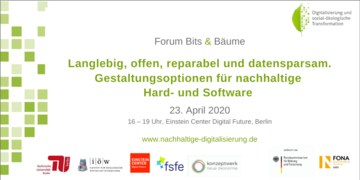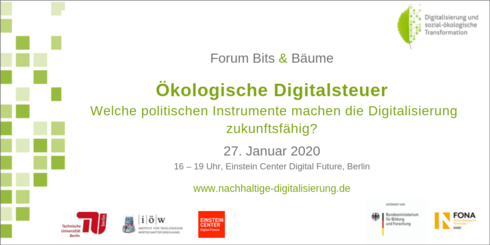Forum Bits & Bäume: Workshop for Sustainable Digitalization
Forum Bits & Bäume was created at the Bits & Bäume Conference, the largest conference to date on the topics of digitalization and sustainability, which took place in Berlin in November 2018. Bits & Bäume is a series of events providing a networking forum for politics, applied science and civil society representatives from the tech and sustainability community and aims to develop proposals for action on how digitalization can be shaped for the future.
Virtual Forum Bits & Bäume: Durable, open, repairable and data-saving Design options for sustainable hardware and software
Thursday, 23 April 2020
Digital technologies lead to an ever increasing consumption of energy and resources. Along with our use of technical appliances and digital services, this is mainly the result of how software is programmed and hardware material equipped as well as how they are licensed. Mandatory software updates, which constantly place new demands on hardware and discontinued support for previous software solutions are examples of how users are compelled to replace intact hardware with new devices. If more and more everyday objects are networked with each other, the problem of increasing energy and resource consumption using more and more devices will become even more acute.
How can hardware and software be made sustainable? Factors such as durability, repairability, and sparing use of resources play a decisive role in the production and use of hardware. For software, key issues include energy saving, long-term updatability, and data compression as well transparency and autonomy. It is important to consider more deeply the material and immaterial basis of digitalization taken together. In the 3rd Forum Bits & Bäume we will discuss the following: design options for sustainable hardware and software; existing approaches for open hardware and software as often practiced in fab labs and makerspaces; the challenges for political regulation; existing frameworks such as Right to Repair, the Eco-Design Directive, or the Blue Angel for software.
In the 3rd Forum Bits & Bäume we will discuss the following:
- design options for sustainable hardware,
- existing approaches for open hardware and software as often practiced in fab labs and makerspaces,
- the challenges for political regulation,
- existing frameworks such as Right to Repair, the Eco-Design Directive, or the Blue Angel for software.
When: 23 April 2020, 16:00 –19:00
Where: Einstein Center Digital Future, Wilhelmstraße 67, 10117 Berlin
Organizers: Institute for Ecological Economy Research (IÖW) and Technische Universität Berlin, and the Chair of Socio-Ecological Transformation in the context of the Digitalization and Socio-Ecological Transformation Junior Research Group in cooperation with the Einstein Center Digital Future, Konzeptwerk Neue Ökonomie (laboratory for new economic ideas) and Free Software Foundation Europe. The event is sponsored by the Federal Ministry of Education and Research (BMBF) as part of its socio-ecological research funding concept.
Second Forum Bits & Bäume: The impact of taxation as an environmental steering instrument for sustainable digitalization remains insufficient. Text & Media
Monday, 27 January 2020
Digitalization and climate protection - two hot topics whose political design is currently the subject of much debate. (How) can a digital tax and a CO2 tax contribute to the goal of sustainable digitalization? Participants at the second Forum Bits & Bäume on 27 January 2020 concluded that as a political instrument, these forms of taxation do not have a sufficient environmental steering impact on the digital economy. Incentives for digital and environmental regulation needs to be created at both national and international level.
Taxation as a means to achieve sustainable digitalization
Steffen Lange from the Institute for Ecological Economy Research (IÖW) presented the impacts of digitalization on the environment. According to Lange, the increasing use of information and communication technologies (ICTs) is currently resulting in increased greenhouse gas emissions. Carbon taxes or increased emissions trading are possible solutions to reduce climate-harming emissions. As IT companies currently pay below average taxes, redesigning the tax system at global level could help finance work in the public domain. However, Lange doubts if these measures alone are sufficient to achieve the goal of sustainable digitalization.
Digitalization’s ecological backpack
Kora Kristof from the Umweltbundesamt (UBA), the German federal environmental office, demonstrated the enormous ecological impacts of digitalization. These include: Resource consumption for infrastructure and hardware as well as growing energy consumption due to high data volumes, especially in video streaming The high energy footprint of data centers as central links in the digital network Approved CO2 taxes will not be sufficient to reduce this footprint to a sustainable level, as they do not specifically address the digital economy. Kristof sees potential for reform in expanding the taxation of environmental impact and resource use, as well as in complementary instruments such as eco-design requirements or in public procurement.
Digitalization, the economy and future affluence
Christoph Wicher from the Federal Ministry of Finance (BMF) believes that digitalization is of great relevance for established and new businesses. The successes of major digital companies have indicated a possible transition. Wicher stressed the need to design and implement smart taxation instruments to achieve social and ecological goals and help avoid inefficiency.
Political instruments under discussion
The questions raised in this interactive fishbowl discussion were explored in greater depth by Dieter Janecek, member of the Bundestag for Bündnis 90/Die Grünen, Deborah Schanz from Ludwig-Maximilians-Universität Munich, Sarah Ganter from the Friedrich-Ebert-Stiftung and Tilman Santarius from Technische Universität Berlin.
Sustainability yet to play a role in discussions at international level
The experts were united in their opinion: The various options for digital taxation under discussion are yet to have any particular ecological steering effect. Linking taxation and digitalization has yet to feature in the international debate concerning a unified tax legislation for multinationals The “classic issues" championed by civil society actors such as tax justice in world trade still predominate. The panel spoke in favor of an international solution to these problems. As this could take some time to achieve, incentives for digital and ecological regulations should be established at national level in the meantime.
Artificial intelligence for sustainable development? The first Forum Bits & Bäume shows what still needs to be done
Tuesday, 10 September 2019
Autonomous driving should make the journey to work more pleasant, data-based crime prognoses produce safer cities, intelligent language recognition make language learning a thing of the past. Artificial intelligence (AI) – A technological leap forward for sustainability as well? Or a heavy ethical and ecological backpack? Scientists and representatives from business and civil society discussed these issues with policymakers at the first Forum Bits & Bäume on 10 September 2019.
Artificial intelligence consumes a lot of energy
Artificial intelligence: Machines learn and improvise like humans. Using complex models of interconnected neurones enables machines to solve a range of challenging problems. So far, "strong" AI, the comprehensive replication of neural networks, is still not widespread. Instead we can see “weak” AI at use in language and facial recognition, search machines, and autonomous vehicles and chatbots. To be able to solve tasks, these neural networks require comprehensive training. And this training in particular consumes a lot of energy. To recognize a face, a machine has to be fed with dozens to millions of images. It is estimated that training one neural network produces about as much CO2 as a return flight from Berlin to Madrid. An increase in the number of applications is resulting in a rapid increase in energy consumption.
But can AI contribute to greater energy efficiency and sustainability in the future? Author Tim Daum, who gave the opening talk, remains critical. So far, “sustainable AI" has been limited to making data centers more efficient, for example. By doing so, AI is primarily solving problems which it has created itself. And thus far, the use of AI has mainly served to find new ways to encourage people to consume more. This is why Daum called for social benefits to be placed in relation to energy and resource use.
However, in the energy sector, AI could save resources: The expansion of renewable energies is making the energy market more complex. Using AI and intelligently networked systems, grid utilization can be increased. Swantje Gährs from the Institute for Ecological Economy Research (IÖW) explained that the development of AI applications in energy systems is still very much in its infancy. It remains to be seen if AI will lead to a reduction in energy consumption in the future.
A lack of transparency and discriminating AI
AI also raises a number of ethical issues: How transparent are algorithms? How legitimate is it for major tech companies to design these without democratic controls? Olga Levina from Forschungszentrum Informatik (FZI) pointed out that in the USA the police already use predictive policing. This means using large quantities of data to predict the likelihood of crime occurring and then managing police operations on this basis. The problem here is that the data used is from the past, which means that patterns of discrimination in society are reproduced in the system.
However, who develops the algorithms is also a critical factor for sustainable AI. So far, this has been major tech companies like Amazon, Google, etc. The large collections of data available to them give these so-called “champions of the digital economy” an advantage. This makes it difficult for local or non-providers to enter the market and leads to monopolies.
During the forum, a number of ideas were developed for dealing with these problems. Using mixed teams of developers could help design more diverse applications. Applications should undergo “lab tests” to examine their impact before they are released on the market. Society should also have a bigger role to play in deciding which AI it wants.
Society needs more say in shaping AI
How can politicians actively and sustainably shape AI? This question was addressed during a fishbowl discussion by Anna Christman, member of the Bundestag for Die Grünen, Stefan Ullrich from the Weizenbaum Institute and Mattihias Spielkamp from AlgorithmWatch. It is the task of civil society and politicians to reclaim AI for society and place this in the center of the debate. This is particularly important for situations where judgments are being made about people. This also means developing standards and criteria which apply to everyone. Research policy is an important factor here. Up until now, sustainability has scarcely figured in promoting AI, and that has to change. It is the responsibility of AI experts to enable debate about AI by revealing how it works and what its impacts are. Only by doing so can society effectively demand that AI development be oriented toward the common good.
Forum Bits & Bäume
Over a period of two years, Forum Bits & Bäume offers an open discussion space to focus more strongly on the sustainable design of digitalization and to introduce scientific and civil society topics and demands into the political discourse. The events are conducted as dialogues with active workshop elements in order to develop specific policy proposals and design options and prepare these for public and political debate.
Forum Bits & Bäume is organized by the Digitalization and Socio-Ecological Transformation research group of the Institute of Ecological Economy Research and TU Berlin, in cooperation with the Einstein Center Digital Future and other changing partners. The project is funded by the Federal Ministry of Education and Research (BMBF) as part of its social-ecological research funding project (SÖF).


